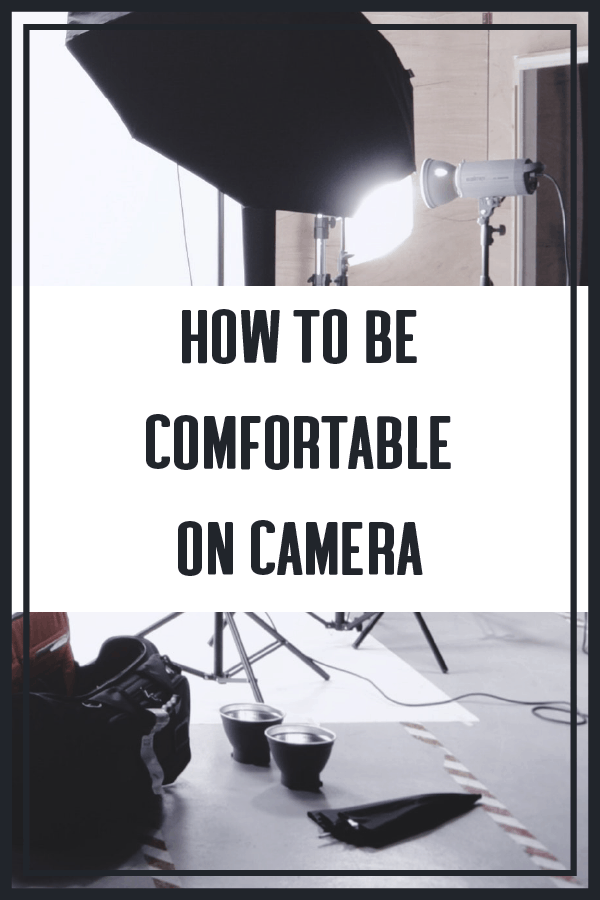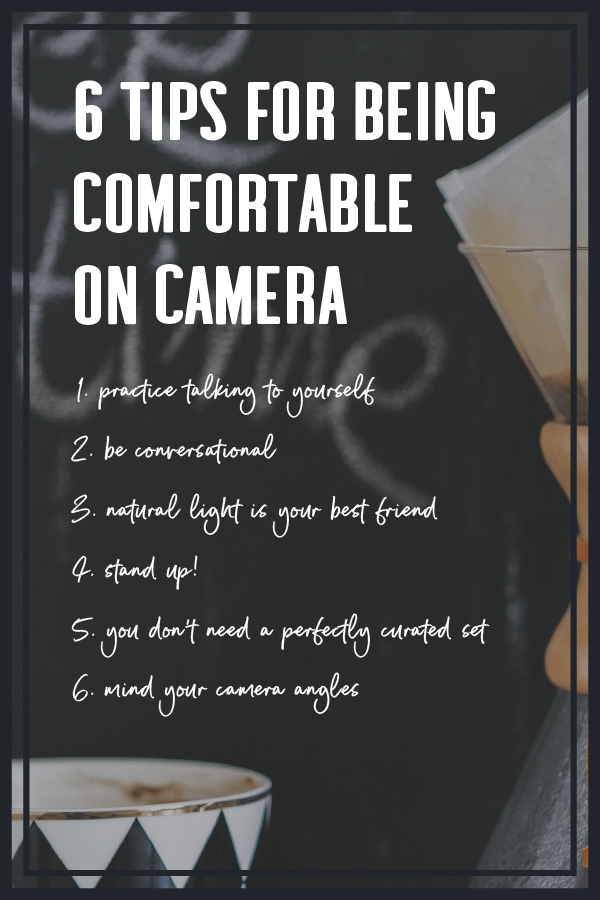How to Be Comfortable on Camera
Talking to a camera doesn’t actually come naturally to me, so it’s not a huge surprise that learning how to be comfortable on camera is something bloggers struggle with. I totally get it… it’s totally weird at first! But you don’t have to be an extrovert or have a spotlight personality in order to learn how to be comfortable on camera.
Back in 2015, I wrote a guest post on Brilliant Business Moms called “6 Brilliant Tips for Getting Comfortable on Camera.” These tips still apply today, and they’re still my top 6 tips for learning how to be comfortable on camera! In this post, I am sharing my favorite 6 tips for being and becoming comfortable and confident on camera, whether it’s for YouTube videos, Livestreams, or even Instagram Stories!
Some product links in this post are affiliate links, and I will be compensated when you purchase by clicking our links. Read my disclosure policy here.
Are You Camera Shy?
I had a conversation with my hair stylist the other day (hi Greyson!) and he said that he feels weird doing Instagram stories where he’s talking to the camera, even from the comfort of this home.I was really surprised, honestly! Greyson is a confident person, he’s articulate, he doesn’t really seem shy, and he has a great personality… perfect for any kind of social video, no matter the platform. It’s been so long the first time I set up my camera and start talking to it, that perhaps I take that comfort for granted and forget that this is something that people struggle with. The truth is: it’s NOT natural to talk to a camera! So if you feel camera shy, you are totally normal. Even if you’re comfortable with it, and used it, that doesn’t make it natural. It still feels uncomfortable to talk to a camera.

How to Overcome Fear of Being on Camera
Being comfortable on camera is a key component of creating YouTube videos, social videos of any kind where you’re on camera and speaking to the camera, and this even applies to Instagram Stories. Now, if you have mastered on-camera confidence (or even if you’re still working on it) and you are creating YouTube videos, you really need to take a look at The Search & Rescue Strategy for attracting your ideal audience. No more uploading videos willy nilly… Crossing your fingers and just hoping to get “picked up by the algorithm” is not a strategy! But the Search & Rescue Framework is a guide that will help you align your video topics with YouTube’s algorithm, so that YOUR videos who up in the search results on YouTube. That way, you’ll get views on your videos and subscribers every time you publish a video. You’ll actually see an ROI on publishing videos to YouTube!
>> Click here to download the Search & Rescue Framework here (free download) <<
How to Be Comfortable on Camera
In Episode 32 of the Video Pursuit Podcast, I cover my 6 favorite tips for being and becoming comfortable on camera. When I say that “if I can do it, you can it,” I truly mean it… I was NOT an on-camera person, and these are 6 things I had to overcome when I first started the VidProMom YouTube channel 4 years ago.
Listen to Episode 32: How to Be Comfortable on Camera
1. Practice Talking To Yourself
Back when I started my channel, I was always thinking about the videos I would be creating. So, during my 15-minute commute to work, I would practice talking about those topics, alone, out loud. It was super weird at first, but it was a great way to practice getting words from my brain to come out of my mouth. We all have internal dialogue, but thinking words is a lot different than speaking words, so that’s why practicing talking to yourself is important for getting comfortable on camera. Have you ever had to make an uncomfortable phone call, and you were so worried you’d trip over your words or say something stupid, so you practice what you’d say ahead of time? It’s exactly like that.
2. Be Conversational on Camera
People who watch your videos want to know you! They want to get to know and like you, so they can trust you. When you’re talking to a camera, be conversational instead of rigid or robotic. You can let your personality shine a little bit, and if you make a mistake you can always re-do it. “Pretend the camera is your best friend.” We’ve all heard that before, right? The thing is, the people on the other END of the camera are your BFFs. They’re the people you are trying to reach by doing video in the first place. It helps me to write a script for my videos, but I do not read a script. I don’t use a teleprompter or anything like that. I write a script so that I have something to go off of, and so that I can easily turn my videos into a blog post (the post practically writes itself). A script helps me stay on point and ensures that I remember to cover all of the points that I intended to cover, but I don’t deliver it word-for-word. A script is just a guide.
3. Natural Light is Your Best Friend
This might sound like a technical tip or shooting tip, but it’s actually a confidence tip. When you shoot a video in a space, whether it’s your house or outside, where light is filling your face, you’re going to appreciate the lack of harsh shadows that draw attention to wrinkles and skin imperfections. You don’t want to shoot in direct sunlight – that would be too harsh and create shadows. But when you can find a place in your house (or, try your car!) where you have some natural light coming in from all angles (not behind you though), you should have plenty of great lighting. When I first started, I didn’t want to spend money on a lighting kit because I didn’t know what I was doing! So I shot my videos on my indoor porch, where natural light filled the whole room nicely. This may sound counter-intuitive, but when you are well lit, any wrinkles, blemishes, and skin imperfections sort of blend in. When you’re poorly light, the harsh shadows actually make those imperfections stand out by drawing attention to them.
4. Stand Up
This is one of my favorite ninja tricks! When I first started my videos, I put a lot of thought into how I wanted everything to be set up. I wanted to be sitting on my couch–because couches are comfortable–so that I’d feel more relaxed and comfortable with the camera. So, I tried that until I switched it up one day and shot a video standing up. Game changer! If you’re lounging on your coach, you’re not exactly bringing energy and enthusiasm. Nobody gives a speech sitting down (unless they physically have to), right? Stand up so that you can command the space. You’re there to deliver a message. I noticed that when I shot a video standing up, it was easier to have more energy in my videos and even bring out my personality a little bit more. I think sitting on the couch was just too relaxed, and my brain couldn’t be in “command” mode. Now, I have a much better idea of where my brain needs to be (so to speak) to bring energy and enthusiasm, so I can do it sitting down. I record my podcast sitting down, and present live streams and masterclass sitting down too.
5. You Don’t Need a Perfectly Curated Set
When I first started, I didn’t have an office or any kind of a studio. The enclosed porch that I shot on was actually the entryway to my house! So, it was a total mess. But the way I positioned myself and the camera so that I had the best light, I had a long wall-mounted coat rack behind me. But the coat rack was messy with coats, bags, and all the crap families hang on a coat rack! So instead of obsessing over my “set” or deciding not to shoot videos because I don’t have a set, I made the coat rack work for me. I re-arranged the coats and bags on the rack, so the colorful fun stuff was showing. I had a colorful bag that I’d bring out, and I’d make sure my kids jackets (which were pink, green and aqua) where hanging over my husband’s coats which were dark blue or black. It was actually a really easy way to create a background “set” that was a little more on brand for me.
6. Mind Your Camera Angles
I first learned this tip from Amy Landino, years ago, and it’s really easy. This works for YouTube videos, Instagram stories, live streams, and everything. You want your camera to be angled down at you a little bit. Don’t set your camera at exactly eye level. Set it at the top of your head, and then angle it down at you. This will define the shape of your face and define your jawline. If you’re worried about having a double chin, this will work like magic. Overall, it’s a little bit more of a flattering angle.
The best tip I could possibly give you for being comfortable on camera is to practice. You have to actually do it. The great thing about video is that you can re-do it! We all start somewhere, and for most of us, it starts with being incredibly uncomfortable on camera but doing it anyway. You can only get better from there.
Don’t forget to grab the Search & Rescue Framework for rapidly growing your blog audience on YouTube. No more uploading videos willy nilly! Click here to download it now.

